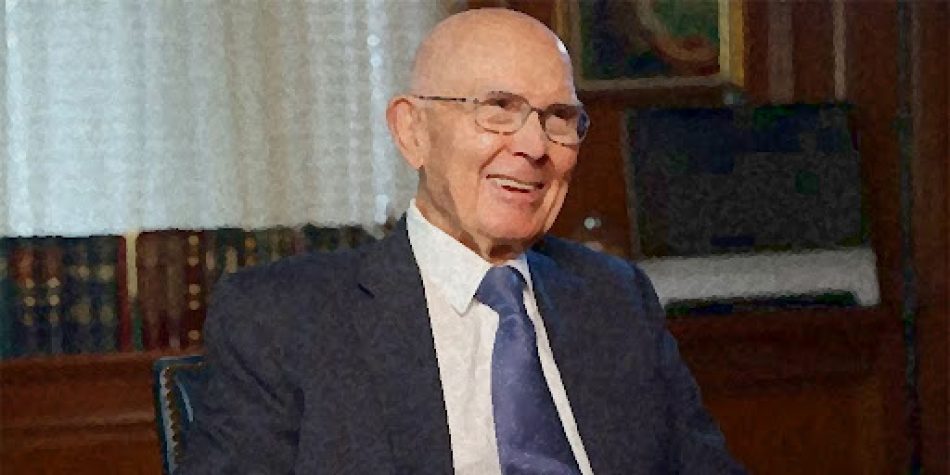In October 2020, Dallin H. Oaks, the second most senior leader of The Church of Jesus Christ of Latter-day Saints, delivered an address titled “Racism and Other Challenges” at a Brigham Young University devotional. Oaks’ address to the BYU audience, and by extension to a broader religious community, is not merely a call to moral action but a theological imperative. He situates racism within the larger narrative of Christian doctrine and not only offers a theological rebuke against racism, but emphasizes the profound truth that all individuals, regardless of their racial or ethnic heritage, are divine creations. He calls for active engagement with our fellow beings, grounded in the fundamental principle of love that Christ Himself espoused.
His remarks remain both poignant and relevant today.
Perhaps the most quotable words from his remarks were simple, “Of course, Black lives matter! That is an eternal truth.” His remarks came on the heels of a summer marked by protests over the murder of George Floyd at the hands of a police officer. The organization Black Lives Matter, which was founded in 2013, rose to national prominence, with its name becoming a rallying cry for racial justice. By echoing those same lines, he connected the political moment to theological teachings. All individuals, regardless of their racial or ethnic heritage, are divine creations.
Many prophetic statements only have their complete meaning fully understood with the passage of time. More than three years later, the political conflicts that backgrounded Oaks’ original remarks no longer provide the same context. This separation may allow us to start the process of understanding the fuller theological ramifications of his remarks.
Oaks is a former lawyer and judge and has a reputation as a very careful speaker. So, our analysis takes for granted that his word choice was quite intentional. And we intend to focus on his remarks about the phrase “Black lives matter.”
Perhaps an understated element of his remarks was the legitimization of a thing that could be described as a “Black life.”
By saying that “Black lives matter,” Oaks establishes as a first principle that Black lives exist. These lives are marked by challenges specific to their set of circumstances. Oaks quoted Russell M. Nelson, the President of the Church of Jesus Christ, as saying, “I grieve that our Black brothers and sisters the world over are enduring the pains of racism.” Just three weeks prior, in the faith’s General Conference, Oaks had said, “We must do better to help root out racism.” His formulation here seems to suggest that the necessary a priori understanding is that Black lives exist and experience the racism that is to be rooted out.
Once Oaks has identified Black lives as a matter worthy of consideration, he states that these lives “matter.” Matter, in this context, is fairly amorphous. That something “matters” is ultimately a pretty low bar and demands very little of the acknowledger. So, Oaks is sure to expand on this in his remarks.
He explains that we should not believe that different races qualify as “first-class” or “second-class.” He concludes, “We condemn racism by any group toward any other group worldwide.” While his remarks were clearly influenced by the political circumstances in the United States, where Oaks and other senior leaders of the Church are headquartered, their ramifications expand to multiple similar conflicts in many nations across the globe.
For Oaks, “Black lives matter” appears to mean that the quality of being Black does not affect importance in the eyes of God, nor should it in the eyes of others.
Oaks also positions his remarks within the larger tradition of racial equality within the Church of Jesus Christ. He does not address the Church’s race-based priesthood ban directly. However, his statement that “Any … official practices of racism involve one group whom God created exercising authority or advantage over another group God created” demonstrates a separation from those policies. He describes official policies that create first and second-class races as “outlawed” by the Lord in D&C 101. Rather than focus on that history, Oaks seeks to connect with the progressive racial policies of the faith’s founder Joseph Smith, who strongly advocated against slavery and did ordain Black men to the priesthood. Create the kind of society where people of all races are free from racism.
Latter-day Saints believe in an ongoing process of revelation from prophets and apostles who guide the Church in the here and now. Declaring that these statements against racism are authoritative, Oaks communicated to his Latter-day Saint listeners that they should be treated with the same respect and deference as scripture.
Each of these remarks was given in the lead-up to the 2020 election. Oaks’ remarks clearly indicate his belief that our faith should impact how we behave as political actors. As a new election season begins, their teachings ought to become foundational to our own process in choosing the leaders who will create the kind of society where people of all races are free from racism.

















